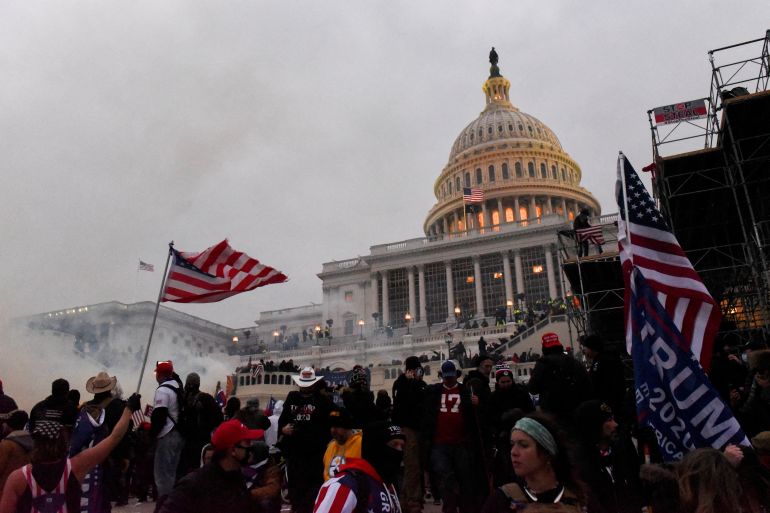US Congress passes new election rules in response to January 6
New provisions to US Electoral Count Act make it more difficult for politicians to prevent peaceful transfer of power.

The United States Congress on Friday has given final passage to legislation changing the Electoral Count Act, an arcane law that governs the certification of a presidential contest.
The legislation marks the strongest effort yet to avoid a repeat of former US President Donald Trump’s violence-inflaming push to reverse his loss in the 2020 election.
Keep reading
list of 3 itemsUS Supreme Court hears arguments in Alabama voting rights case
5 key takeaways from January 6 panel’s report on US Capitol riot
The House passed the act’s overhaul as part of its vast, end-of-the-year spending bill after the Senate approved identical wording Thursday. The legislation now goes to President Joe Biden for his signature.
In a statement on Friday, Biden hailed the legislation’s inclusion in the spending bill, calling it “critical bipartisan action that will help ensure that the will of the people is preserved”.
It is the most significant legislative response the US Congress has made so far to address Trump’s aggressive efforts to upend the popular vote. And it was a move urged by a select committee in the US House of Representatives charged with investigating the events of January 6, 2021, when Trump supporters attacked the US Capitol.
In its 800-plus page report released on Thursday, the House committee documented internal White House discussions between Trump and his advisers over whether to violate provisions of the Electoral Count Act by refusing to count certain electoral votes.
Friday’s legislation amending the 1887 law — which has long been criticised as poorly and confusingly written — won bipartisan support. The new provisions would make it harder for future presidential losers to prevent the ascension of their foes, as Trump tried to do on January 6, 2021.
“It’s a monumental accomplishment, particularly in this partisan atmosphere, for such a major rewrite of a law that’s so crucial to our democracy,” said Rick Hasen, a law professor at the University of California Los Angeles. “This law goes a long way toward shutting down the avenues Trump and his allies tried to use in 2020, and could have been exploited in future elections.”
On January 6, Trump targeted Congress’ ratification of the Electoral College vote. He tried to exploit the vice president’s role in reading out the states’ electors to get Mike Pence to block Biden from becoming the next president by omitting some states Biden won from the roll.
The new provisions make clear that the vice president’s responsibilities in the process are merely ceremonial and that the vice president has no say in determining who actually won the election.
The new legislation also raises the threshold required for members of Congress to object to certifying the electors. Before, only one member of the House and Senate respectively had to object to force a roll-call vote on a state’s electors.
That helped make objections to new presidents something of a routine partisan tactic, with Democrats objecting to the certification of George W Bush’s two elections and Trump’s in 2016.
Those objections, however, were mainly symbolic and came after Democrats had conceded that the Republican candidates won the presidency.
On January 6, 2021, Republicans forced a vote on certifying Biden’s wins in Arizona and Pennsylvania even after the violent attack on the Capitol, as Trump continued to insist falsely that he won the election. That led some members of Congress to worry the process could be too easily manipulated.
Under the new rules, one-fifth of each chamber would be required to force a vote on states’ slates of electors.
The new provisions also ensure only one slate of electors makes it to Congress after Trump and his allies unsuccessfully tried to create alternative slates of electors in states Biden won.
Each governor would now be required to sign off on electors, and Congress cannot consider slates submitted by different officials. The bill creates a legal process if any of those electors are challenged by a presidential candidate.
The legislation would also close a loophole that was not used in 2020 but election experts feared could be: a provision that state legislatures can name electors in defiance of their state’s popular vote in the event of a “failed” election.
That term has been understood to mean a contest that was disrupted or so in doubt that there was no way to determine the actual winner. But it is not well-defined in the prior law.
Now a state could move the date of its presidential election — but only in the event of “extraordinary and catastrophic events,” like a natural disaster.
Hasen said that while the changes are significant, dangers still remain to democracy, noting that in Arizona, the Republican nominee for governor, Kari Lake, was waiting on a ruling Friday in a lawsuit she filed to overturn the victory of her Democratic opponent, Katie Hobbs.
“Nobody should think that passage of this legislation means we’re out of the woods,” Hasen said. “This is not one and done.”